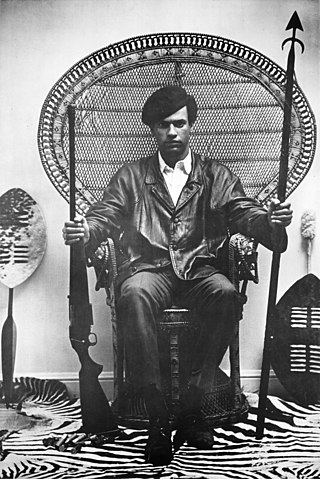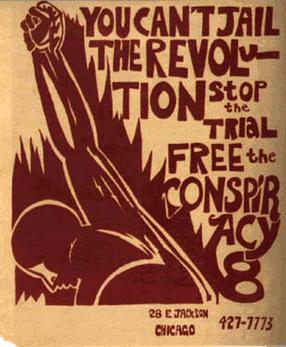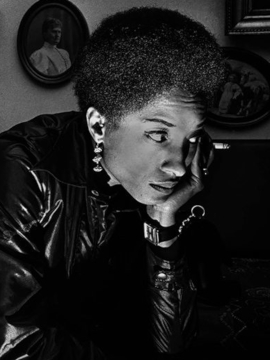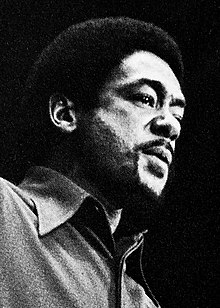
Huey Percy Newton was an African American revolutionary and political activist who founded the Black Panther Party. He ran the party as its first leader and crafted its ten-point manifesto with Bobby Seale in 1966.

The Chicago Seven, originally the Chicago Eight and also known as the Conspiracy Eight or Conspiracy Seven, were seven defendants – Rennie Davis, David Dellinger, John Froines, Tom Hayden, Abbie Hoffman, Jerry Rubin, and Lee Weiner – charged by the United States Department of Justice with conspiracy, crossing state lines with intent to incite a riot, and other charges related to anti-Vietnam War and 1960s counterculture protests in Chicago, Illinois during the 1968 Democratic National Convention. The Chicago Eight became the Chicago Seven after the case against codefendant Bobby Seale was declared a mistrial.

Merritt College is a public community college in Oakland, California. Merritt, like the other three campuses of the Peralta Community College District, is accredited by the Accrediting Commission for Community and Junior Colleges. The college enrolls approximately 6,000 students.

The black power movement or black liberation movement was a branch or counterculture within the civil rights movement of the United States, reacting against its more moderate, mainstream, or incremental tendencies and motivated by a desire for safety and self-sufficiency that was not available inside redlined African American neighborhoods. Black power activists founded black-owned bookstores, food cooperatives, farms, media, printing presses, schools, clinics and ambulance services.
John Radford Froines was an American chemist and anti-war activist, noted as a member of the Chicago Seven, a group charged with involvement with the riots at the 1968 Democratic National Convention in Chicago. Froines, who held a Ph.D. in chemistry from Yale, was charged with interstate travel for purposes of inciting a riot and with making incendiary devices, but was acquitted. He later served as the Director of Toxic Substances at the federal Occupational Safety and Health Administration and then director of UCLA’s Occupational Health Center. He also served as chair of the California Scientific Review Panel on Toxic Air Contaminants for nearly 30 years before resigning in 2013 amid controversy and claims of conflict of interest.
Alex Rackley was an American activist who was a member of the New York chapter of the Black Panther Party (BPP) in the late-1960s. In May 1969, Rackley was suspected by other Panthers of being a police informant. He was brought to Panther headquarters in New Haven, Connecticut, held captive and tortured there for several days, condemned to death, taken to the wetlands of Middlefield, Connecticut, and murdered there.

George W. Sams Jr. was a member of the Black Panther Party convicted in the 1969 murder of New York Panther Alex Rackley, which resulted in the New Haven Black Panther trials of 1970.

In 1969-1971 there was a series of criminal prosecutions in New Haven, Connecticut, against various members and associates of the Black Panther Party. The charges ranged from criminal conspiracy to first-degree murder. All charges stemmed from the murder of 19-year-old Alex Rackley in the early hours of May 21, 1969. The trials became a rallying-point for the American Left, and marked a decline in public support, even among the black community, for the Black Panther Party.
Lonnie McLucas was a Black Panther Party member in Bridgeport, Connecticut who was found guilty of conspiracy to commit murder for his involvement in the May 21, 1969 murder of New York City Panther Alex Rackley, in the first of the New Haven Black Panther trials in 1970.
The Ten-Point Program or The Black Panther Party for Self-Defense Ten-Point Platform and Program is a party platform written by Huey P. Newton and Bobby Seale in 1966 for the Black Panther Party.

The Black Panther Party was a Marxist–Leninist and black power political organization founded by college students Bobby Seale and Huey P. Newton in October 1966 in Oakland, California. The party was active in the United States between 1966 and 1982, with chapters in many major American cities, including San Francisco, New York City, Chicago, Los Angeles, Seattle, and Philadelphia. They were also active in many prisons and had international chapters in the United Kingdom and Algeria. Upon its inception, the party's core practice was its open carry patrols ("copwatching") designed to challenge the excessive force and misconduct of the Oakland Police Department. From 1969 onward, the party created social programs, including the Free Breakfast for Children Programs, education programs, and community health clinics. The Black Panther Party advocated for class struggle, claiming to represent the proletarian vanguard.

Revolutionary Suicide is an autobiography written by Huey P. Newton with assistance from J. Herman Blake originally published in 1973. Newton was a major figure in the American black liberation movement and in the wider 1960s counterculture. He was a co-founder and leader of what was then known as the Black Panther Party (BPP) for Self-Defence with Bobby Seale. The Chief ideologue and strategist of the BPP, Newton taught himself how to read during his last year of high school, which led to his enrollment in Merrit College in Oakland in 1966; the same year he formed the BPP. The Party urged members to challenge the status quo with armed patrols of the impoverished streets of Oakland, and to form coalitions with other oppressed groups. The party spread across America and internationally as well, forming coalitions with the Vietnamese, Chinese, and Cubans. This autobiography is an important work that combines political manifesto and political philosophy along with the life story of a young African American revolutionary. The book was not universally well received but has had a lasting influence on the black civil rights movement.

Mark Everett Comfort was a community activist who worked in early Oakland grassroots civil rights movements in the 1960s, before moving to Lowndes County, Alabama.

Ericka Huggins is an American activist, writer, and educator. She is a former leading member of the political organization, Black Panther Party (BPP). She was married to fellow BPP member John Huggins in 1968.

Elbert Howard, better known as Big Man, was an American civil rights activist and author who was one of the founding members of the Black Panther Party.

Seize The Time: The Story of The Black Panther Party and Huey P. Newton is a 1970 book by political activist Bobby Seale. It was recorded in San Francisco County Jail between November 1969 and March 1970, by Arthur Goldberg, a reporter for the San Francisco Bay Guardian. An advocacy book on the cause and principles of the Black Panther Party, Seize The Time is considered a staple in Black Power literature.

The Revolutionary People's Constitutional Convention (RPCC) was a conference organized by the Black Panther Party (BPP) that was held in Philadelphia from September 4–7, 1970. The goal of the Convention was to draft a new version of the United States Constitution and to unify factions of the radical left in the United States. The RPCC represented one of the largest gatherings of radical activists across movements and issues in the United States. The Convention was attended by a variety of organizations from the Black Power Movement, Asian American Movement, Chicano Movement, American Indian Movement, Anti-war movement, Women's Liberation, and Gay Liberation movements. Estimates of attendance range from 6,000 to 15,000. Attendees convened in workshops to draft declarations of demands related to various issues, which were ultimately intended to be incorporated into a new constitution which would function as the final vision of those movements. The RPCC also signified a shift in BPP focus from black self-defense to a broader revolutionary agenda. While conflicts did arise during the Philadelphia Convention, the conference was ultimately deemed a success by the Panthers. After the Philadelphia conference, attempts were made to reconvene to finalize and ratify the new constitution in Washington, DC a few months later but ultimately failed due to police interference and Panther disorganization.
All Power to the People: Black Panthers at 50 was an exhibition hosted by the Oakland Museum of California (OMCA) from October 8, 2016, to February 26, 2017. The exhibit was organized by OMCA's senior curator René De Guzman.

Constance Evadine Matthews, better known as Connie Matthews, was an organizer, a part of the Black Panther Party between 1968 and 1971. A resident of Denmark, she helped co-ordinate the Black Panthers with left-wing political groups based in Europe.


















